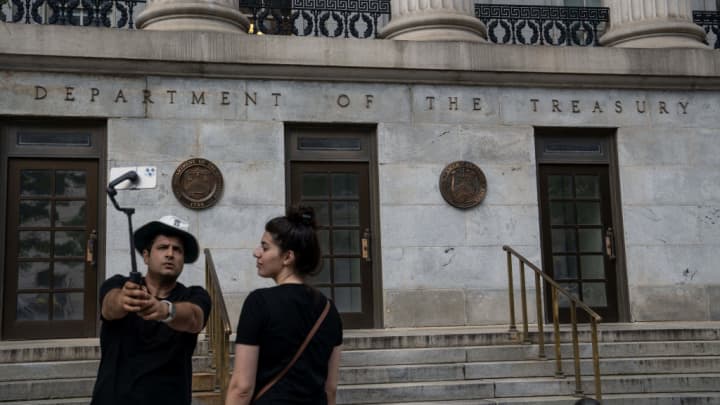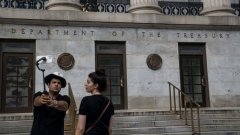
This report is from today's CNBC Daily Open, our new, international markets newsletter. CNBC Daily Open brings investors up to speed on everything they need to know, no matter where they are. Like what you see? You can subscribe .
Mixed markets
Monday, with the Dow Jones Industrial Average the only major index to rise.
Tuesday as investors await Biden's meeting with Xi. South Korea's Kosdaq index rose around 2.2%, snapping a five-day losing streak. Australia's S&P/ASX 200 climbed 0.8% even as a survey showed the country's consumer confidence slipping in November.
Biden-Xi meeting
on Wednesday. That'll be the second time both leaders have met in person since Biden took office. Relations between the world's largest and second-largest economies have been rocky since an
flew into U.S. airspace February. Hence, Biden and Xi will likely focus on "
," according to a political commentator.
Consumer spending fell
month on month, while core retail, which excludes restaurants, declined 0.03%, according to the new CNBC/NRF Retail Monitor. The data differs from the Census Bureau's retail sales report as it's the result of actual consumer purchases — analyzing over 9 billion anonymized credit and debit card transactions — while the Census relies on survey responses.
Exxon invests in green tech
Exxon Mobil, one of the world's largest oil and gas companies, said it aims to become a
. The company will kick off this plan through a drilling operation it's launching at a geological site it purchased earlier this year in southern Arkansas. Exxon said it will produce battery-grade lithium at the site as soon as 2027.
[PRO] One index's 11% jump
U.S. stocks have long outpaced global indexes. But Morgan Stanley thinks
— which has already popped about 25% thus far this year, more than two times the 10.5% of the S&P 500 — will continue its blitz, soaring 11% in 2024. The country's currency will strengthen next year, boosting stocks exposed to international trade, said the bank.
This week will be a significant one for markets. October's consumer price index comes out later today, while on Wednesday, U.S. President Joe Biden will meet his Chinese counterpart Xi Jinping in person for the first time since last November. Investors, focused on the week ahead, are already shrugging off bad news from last week.
On Friday, from stable to negative. The ratings agency pointed to the country's large fiscal deficits and the political polarization within Congress as risk factors for Treasurys.
Moody's move wasn't entirely new. ( and have issued similar cautions.) And even if it were, it's hard to imagine investors spontaneously pivoting from U.S. Treasurys — the world's largest and most liquid market.
"If we go from triple-A to double-A, what does that practically mean? … There's still going to be demand for U.S. Treasurys en masse," as Michael Reynolds, vice president of investment strategy at Glenmede Investment Management, put it.
Indeed, Treasury yields hardly budged Monday despite Moody's warning. The yield on the 10-year note ticked up 1 basis point to 4.638%, while that of the 2-year shed around 3 basis points to end at 5.033%.
Stocks didn't experience major turmoil, either. In fact, the was mostly flat, the added 0.16% and the slipped 0.22%. Trading volume, based on the SPDR S&P 500, was below the 30-day average.
Today's CPI report is likely to cause more gyrations for stocks. Economists expect October's prices to rise 0.1% from September, and 3.3% from a year earlier.
If numbers come in close to or lower than the estimate, that'll please investors because it means the Federal Reserve might be done with rate hikes for the year — or for the whole cycle, the optimistic will say.
As strategist Peter Oppenheimer said, the "good news is that inflation and interest rates now appear to have peaked and our economists continue to expect a soft landing. This backdrop is benign for equity markets, reducing the downside risks for investors."
Of course, reduced headwinds don't mean a smooth journey ahead. With the Israel-Hamas war still developing and economic data in the U.S weakening, risks persist.
— CNBC's Jeff Cox contributed to this report.



